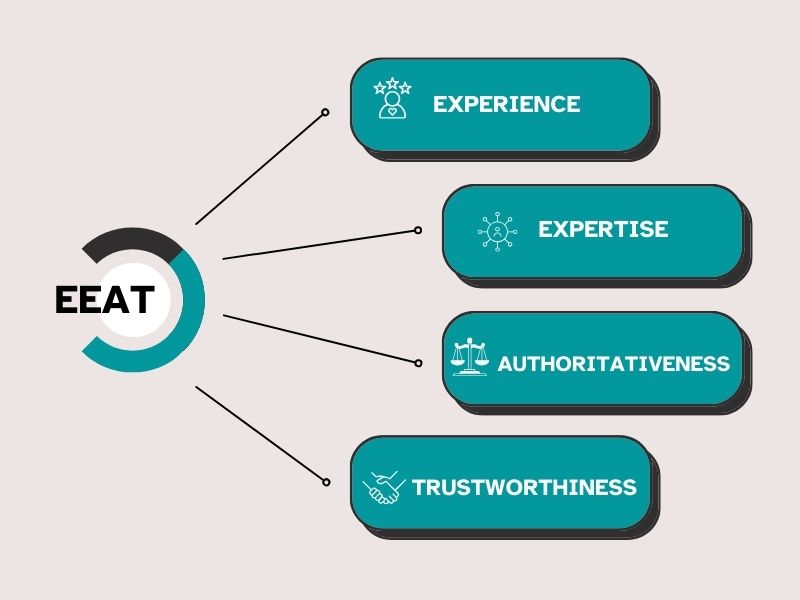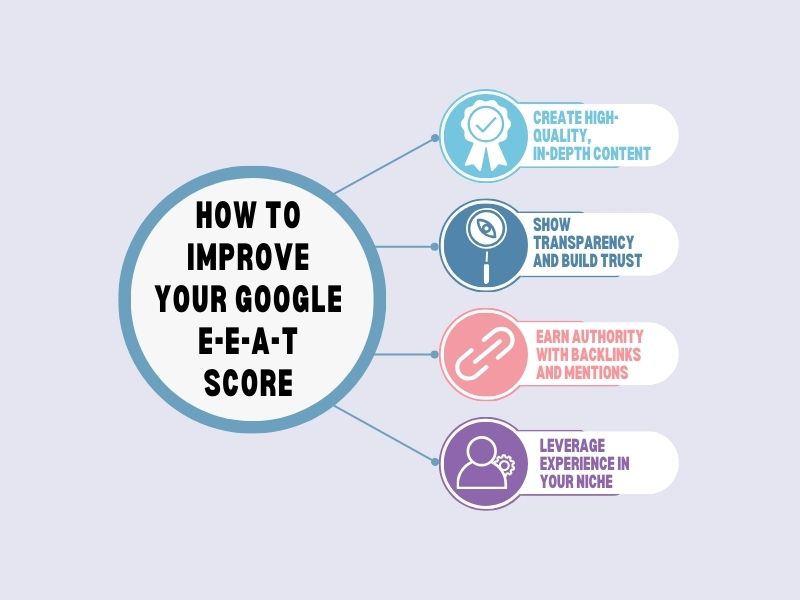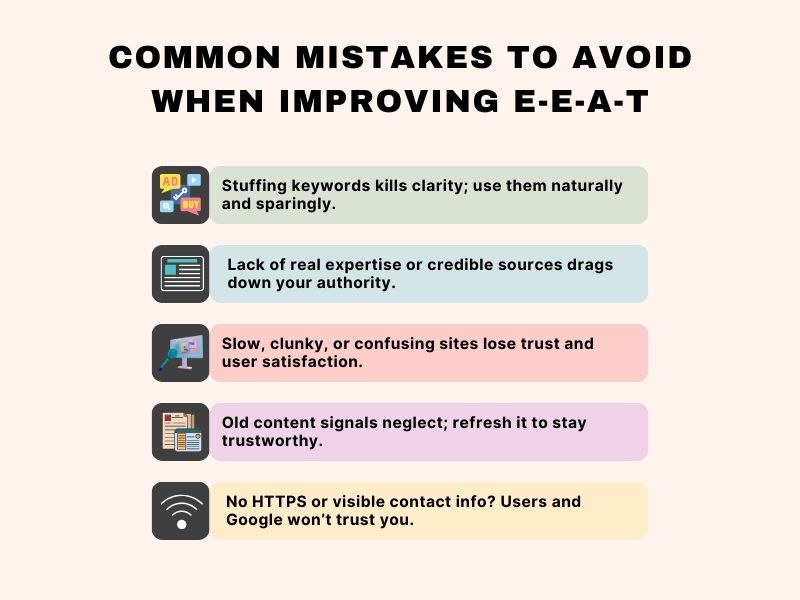Unlock Google E-E-A-T to Boost Credibility, Trust, and Rankings
Table of Contents
ToggleStruggling to get your content noticed by Google?
It’s not just about keywords anymore. To truly rank, you need to unlock Google E-E-A-T, a framework that helps Google evaluate your content’s credibility and depth.
What Is Google E-E-A-T?
When you’re working on improving your site’s ranking, you’ve likely heard of Google E-E-A-T. It stands for Experience, Expertise, Authoritativeness, and Trustworthiness, critical factors that Google uses to evaluate content quality across the web.
Simply put, Google E-E-A-T is how Google measures if your content is reliable, credible, and worthy of a top spot in search results.
Here’s the thing: Google E-E-A-T is not a single ranking factor like backlinks or page load speed. Instead, it’s a framework, a holistic approach to assessing whether a site can be trusted to deliver accurate and high-quality information. If your website doesn’t meet the Google E-E-A-T criteria, no amount of keyword optimization will help you rank higher.
Think of it like this:
- Experience tells Google if the content creator has real-world expertise.
- Expertise confirms that the author knows their stuff.
- Authoritativeness signals that the site and its content are respected in their field.
- Trustworthiness ensures the information is reliable and safe for the audience.
Whether you’re writing content for a health site, an e-commerce store, or even a tech blog, Google E-E-A-T is non-negotiable.
Google’s algorithms are smart enough to sift through content and determine if it’s valuable or just fluff. Without Google E-E-A-T, your website risks being buried beneath competitors who follow these guidelines more diligently.
In this post, you will learn what Google E-E-A-T means, why it’s essential for SEO, and the steps you can take to improve your website’s credibility.
By the end of this guide, you’ll have a clear roadmap to align your content strategy with Google E-E-A-T, ensuring your site gains the trust it needs to succeed in today’s competitive digital landscapes.
Breaking Down Each Part of E-E-A-T
When you first hear the term, you might think What is Google E-E-A-T trying to measure exactly?
Google E-E-A-T stands for Experience, Expertise, Authoritativeness, and Trustworthiness; each plays a unique role in how your content is judged.
Think of it as Google’s way of asking: Do you know what you’re talking about, and can readers trust you? Let’s unpack what each of these pillars means and why they matter for SEO.
Experience
Experience means the writer knows the topic firsthand.
If someone reviews a hiking trail they’ve never walked, readers can usually tell. Google can, too. It wants to see signs like personal stories, firsthand tips, or original photos—things an outsider simply couldn’t fake.
Example:
A local bakery writing about “the best gluten-free baking techniques” will naturally rank better if the baker shares trials, errors, and favorite recipes from real kitchen experiments.
Expertise
Expertise is slightly different. It’s not just “I’ve done it,” it’s “I’m trained, skilled, or deeply knowledgeable.”
Formal credentials help (think doctors writing health blogs), but practical, industry-specific expertise counts too. Content loaded with detailed advice, accurate data, and niche understanding shows real expertise even without a PhD attached.
Example:
A certified fitness coach explaining proper deadlift techniques will automatically sound more credible than a casual gym-goer writing the same guide.

Authoritativeness
Authoritativeness builds over time.
It’s when others in your industry recognize and reference you. You earn it through mentions, backlinks, interviews, speaking gigs, and strong brand presence. It’s not something you declare; others essentially crown you with it.
Example:
When a digital marketing blog earns mentions from HubSpot or Moz, that’s a signal Google picks up as, “Yep, this source knows its stuff.”
Trustworthiness
Trust is the glue holding E-E-A-T together.
Google wants to send users to sites that feel safe, honest, and transparent. That means having clear authorship, secure connections (HTTPS), easy-to-find contact information, and zero shady practices.
Example:
An e-commerce site with clear refund policies, authentic customer reviews, and verified payment options wins trust faster and ranks better.
How Does Google E-E-A-T Affect SEO?
With a clearer understanding of Google E-E-A-T, you might be wondering: how does it affect SEO?
Google’s algorithms are designed to prioritize high-quality content that offers a great user experience. When your content ranks well in Google’s eyes for Experience, Expertise, Authoritativeness, and Trustworthiness, you’re more likely to achieve high search engine rankings. Content that scores low on these factors, on the other hand, will struggle to appear at the top of search results.
Real-World Example:
Consider a small business blog that writes about digital marketing strategies. Even if they focus heavily on SEO tactics, without showing strong Expertise or gaining recognition within the industry, their content will likely fall behind well-established sites with solid Google E-E-A-T scores, like HubSpot or Moz.
So, while classic SEO techniques (like using targeted keywords) are important, Google E-E-A-T is becoming just as crucial. Websites that lack solid E-E-A-T will find it harder to keep up with the competition, no matter how great their content is.
How to Improve Your Google E-E-A-T Score
To improve your Google E-E-A-T score, it’s all about focusing on creating content that checks off each element of the framework.
Here’s how to do it:
1. Create High-Quality, In-Depth Content
To enhance Expertise, your content should offer well-researched, comprehensive insights. Avoid generalities and provide value that goes beyond the basics.
For example, instead of writing a generic article about SEO tips, break down advanced strategies or share original case studies, data, and real-life applications. Google rewards content that adds meaningful value to users.
2. Show Transparency and Build Trust
Trustworthiness is a huge part of E-E-A-T, and it begins with transparent, reliable information. Make sure your content is fact-checked, and whenever possible, link to authoritative sources. A trustworthy website should also clearly display its policies, such as privacy, terms of service, and return policies.
If you run an e-commerce site, display customer reviews and testimonials on your product pages to signal trustworthiness. Trust signals, like an SSL certificate or user-friendly design, also help boost your score.

3. Earn Authority with Backlinks and Mentions
Authoritativeness is largely driven by backlinks. Google gives higher authority to websites that are linked to by other reputable sites. Focus on building relationships with industry leaders, guest posting, and earning mentions in credible publications. Over time, your domain authority will grow, and so will your E-E-A-T score.
For instance, if your website is in the tech space, getting backlinks from sites like TechCrunch or Wired signals to Google that you are a recognized leader in the field.
4. Leverage Experience in Your Niche
Experience is a new factor that Google has introduced, but it’s just as important as the others. Show that you have hands-on experience with your industry or topic. This could be through case studies, interviews with industry professionals, or personal anecdotes about how your product or service has made an impact.
For example, a fitness blog could showcase personal stories or real customer results from using a particular workout program, proving that your insights are based on experience.
By focusing on these areas, you can improve your Google E-E-A-T score, leading to better search rankings and a stronger online presence.
Common Mistakes to Avoid When Improving E-E-A-T
When working on your Google E-E-A-T score, watch out for these key mistakes that can hurt your SEO efforts.
1. Keyword Stuffing
Using too many keywords can make your content feel unnatural and decrease its readability. Instead, focus on incorporating keywords naturally while providing valuable, well-researched content.
2. Lack of Expertise
Content that doesn’t show real expertise or fails to back up claims with credible sources lowers your Expertise score. Always prioritize accurate, detailed, and well-researched content.

3. Poor User Experience
Slow-loading sites and confusing navigation hurt both Trustworthiness and Experience scores. Ensure your site is mobile-friendly, fast, and easy to navigate for a better user experience.
4. Neglecting to Update Content
Outdated content can reduce your Trustworthiness. Regularly update older posts to reflect the latest information and keep your site reliable.
5. Ignoring Trust Signals
Trust signals like a secure connection (HTTPS), privacy policies, and contact info are essential for improving your Trustworthiness score. Make sure these are visible on your site.
By avoiding these mistakes, you can improve your E-E-A-T score and boost your SEO rankings.
Conclusion
Improving your Google E-E-A-T isn’t just about ticking off a list of best practices—it’s about genuinely creating content that provides value, authority, and trust to your audience. As Google continues to refine its algorithm to prioritize quality over quantity, focusing on Experience, Expertise, Authoritativeness, and Trustworthiness will help you not only rank higher but also build long-lasting relationships with your readers.
By adopting these strategies, you’re setting your website up for sustained success in the competitive world of SEO. Whether you’re a small business owner or an established brand, taking E-E-A-T seriously is a smart move to ensure your content reaches the audience it deserves.
